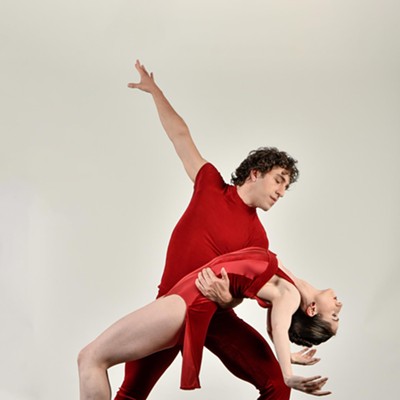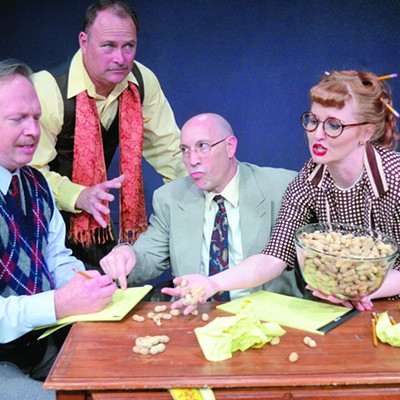Moore's happy to do what he can to help break the desert heat. A popular act at Plush (this is his third visit in two years), he's starting to feel like part of the community. "I'm just really psyched to be playing. It feels really good to be connected there. That's really all I want, to feel like when I'm playing a town, there's a reason I'm there."
His 2004 Yep Roc release, Luminaria, features some rain references and mountain streams, too, no doubt inspired by the climate of his Seattle-area home. But, he says, "I travel as much as I'm home. If I were to try to say that I'm defined by the place I live, that would be a bit dishonest, because really, I'm defined by movement, if anything."
Lately, he's been thinking a lot about movement on water. "The place that I sleep, I'm surrounded by firs and cedar trees (and) by a large body of water, very cold water. I've been writing a lot of nautical songs lately. I've sailed all my life, and I love sailing. I'm so fascinated by the concept of it, the idea of passage."
The last few years have brought Moore through some of the most important passages in a man's life: the birth of two children and the loss of his father after a long illness. "I'm going through a number of new changes, and it's a struggling period, but I enjoy going through a period where I'm kind of redefining my voice, kind of changing tack a little bit, trying a few different things."
Trying different things has been the one constant in Moore's career. The son of a scholar of Eastern religions, Moore lived in India as a child and says the sitar was his first instrument. When the family moved to Austin, he took up violin, but by the time he launched his public musical life, he was an Austin guitar slinger. Considered a blues prodigy, the anticipated fair-haired successor to Stevie Ray Vaughn, he lived a teenage dream on the stage of Austin's legendary Antone's, sitting in regularly with the blues greats who performed there. Soon, he was touring with Joe Ely, eventually opening solo for the Rolling Stones and ZZ Top. The cover art for his first Capricorn release even had him tricked out as a hair god.
He's been living all that down for more than a decade now. "I come from Austin, where guitar playing is in your blood, and you go and you learn how to play guitar, even if you're not trying to. I was really lucky to grow up playing with some really great guitar players, so by that way, I learned some very tasteful guitar playing," he says. "But I've always been a singer first, and always a struggling songwriter, which I'm feeling a little more comfortable with, and those were always where my attention was focused. I see people like David Grissom and Rob Gjersoe and Mitch Watkins. Those guys play guitar, and when they sit down to jam when they're drinking beer, they play guitar. When I sit down to jam, I play songs. That's a real difference."
He may have been a singer first, but he found that singing took as much focus to master as the guitar. The problem was that his voice is inherently, well, beautiful. Fluid, elastic, agile and true, it could have distracted from putting a song across as surely as his guitar histrionics. His challenge was in keeping it real, making it serve the song. "My voice might be prettier than Tom Waits'," he says, "but I wanted it to be just as real when I sing. I had to find that." The measure of his success is that a listener, lulled by his conversational tenor phrasing, can get all goose-bumpy when he shifts for emphasis into a lilting range leap or, especially, a soaring soul falsetto.
Moore's vocal arrangements reflect an eclectic taste, from the Beatles, Elvis and Buddy Holly, to Sam Cooke and the Soul Stirrers and, of course, Tom Waits. His music, though, has evolved so far from blues, there's not even an echo. If you had to pick one influence, it would be Brit-pop, especially the Beatles, and, perhaps, the California psychedelia left in their wake. Moore demurs, "It's such a ridiculous thing to even claim it as an influence because I would assume everyone would claim the Beatles as an influence, whether it was direct or indirect. To tell you the truth, I try to not emulate the Beatles." Still, he speaks from the heart of a fan.
Moore's currently preoccupied rearranging the furniture in his songwriting. The songs on Luminaria are his most mature yet, reflecting the greatest economy and the most refined character development of his five-disc catalog. "Songwriting is not a static thing to me," he says. "I'm at a point right now where I'm re-examining the way I write songs. For right now, it's a lot of editing; I write a lot more songs than I used to write, and I write a lot of really terrible songs. And every now and again, I get one that is better, and sometimes I'll think it's really good, and sometimes I'll change my mind, and sometimes I'll edit it until I hate it, and sometimes I edit it and it turns into a song that's really good. It takes a lot more work than it used to."
Luminaria songs range from the contemplative ballad "Kangaroo Lake," reflecting on the loss of his father, to an ode to the benighted Antarctic explorer Sir Robert Scott, to the tongue-in-cheek, Santo and Johnny-influenced "Ordinary People" ("Don't think I'm unkind if your world is not mine / and you are ordinary people"). Character studies include a pretty spot-on sketch of a music critic ("April"), an admonishment to a woman past her prime ("Caroline") and an almost embarrassingly intimate portrayal of a lover ("Cinnamon").
Moore's set at Plush, following opener and labelmate Robert Skoro, will no doubt draw mostly from the kaleidoscope light of his Luminaria, but as reinterpreted with multi-instrumentalist Allan Fuchs, who will be his sole accompaniment. And then there will be that welcome water music. Catch the wave!












